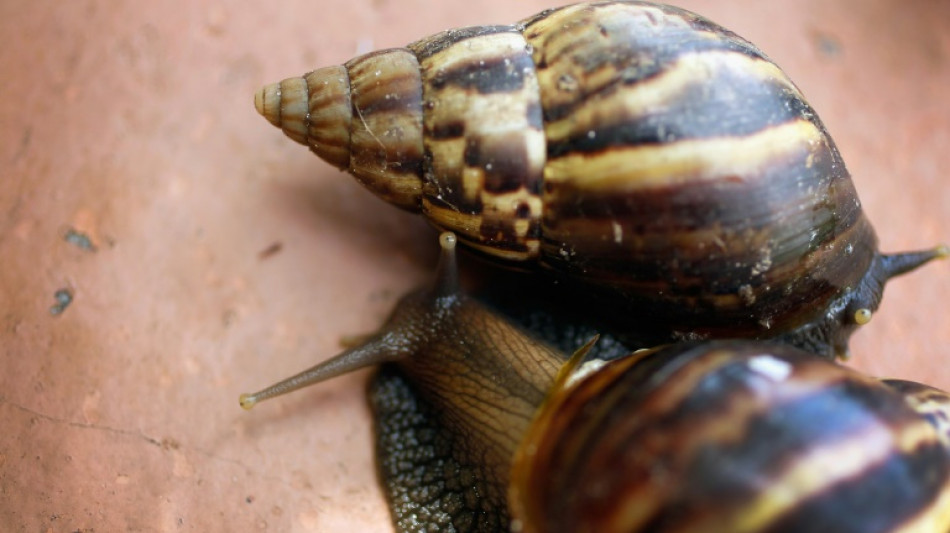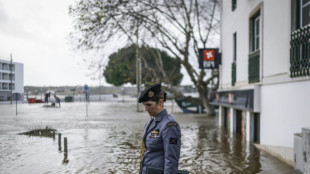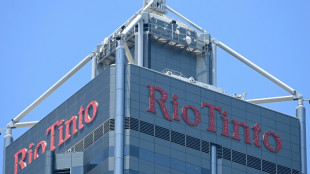
-
 German exports to US plunge as tariffs exact heavy cost
German exports to US plunge as tariffs exact heavy cost
-
Portugal heads for presidential vote, fretting over storms and far-right

-
 Suicide blast at Islamabad mosque kills at least 30, wounds over 130: police
Suicide blast at Islamabad mosque kills at least 30, wounds over 130: police
-
Russia says Kyiv behind Moscow shooting of army general

-
 Greenland villagers focus on 'normal life' amid stress of US threat
Greenland villagers focus on 'normal life' amid stress of US threat
-
Iran, US hold talks in Oman after Trump military threats

-
 Stocks waver as tech worries build
Stocks waver as tech worries build
-
Dupont, Jalibert click to give France extra spark in Six Nations bid

-
 'Excited' Scots out to prove they deserve T20 World Cup call-up
'Excited' Scots out to prove they deserve T20 World Cup call-up
-
EU tells TikTok to change 'addictive' design

-
 India captain admits 'there will be nerves' at home T20 World Cup
India captain admits 'there will be nerves' at home T20 World Cup
-
Stellantis takes massive hit for 'overestimation' of EV shift

-
 'Mona's Eyes': how an obscure French art historian swept the globe
'Mona's Eyes': how an obscure French art historian swept the globe
-
Iran, US hold talks in Oman

-
 Iran, US hold talks in Oman after deadly protest crackdown
Iran, US hold talks in Oman after deadly protest crackdown
-
In Finland's forests, soldiers re-learn how to lay anti-personnel mines

-
 Israeli president visits Australia after Bondi Beach attack
Israeli president visits Australia after Bondi Beach attack
-
In Dakar fishing village, surfing entices girls back to school

-
 Lakers rally to beat Sixers despite Doncic injury
Lakers rally to beat Sixers despite Doncic injury
-
Russian pensioners turn to soup kitchen as war economy stutters

-
 Japan taps Meta to help search for abuse of Olympic athletes
Japan taps Meta to help search for abuse of Olympic athletes
-
As Estonia schools phase out Russian, many families struggle

-
 Toyota names new CEO, hikes profit forecasts
Toyota names new CEO, hikes profit forecasts
-
Next in Putin's sights? Estonia town stuck between two worlds

-
 Family of US news anchor's missing mother renews plea to kidnappers
Family of US news anchor's missing mother renews plea to kidnappers
-
Spin woes, injury and poor form dog Australia for T20 World Cup

-
 Japan's Liberal Democratic Party: an election bulldozer
Japan's Liberal Democratic Party: an election bulldozer
-
Hazlewood out of T20 World Cup in fresh blow to Australia

-
 Japan scouring social media 24 hours a day for abuse of Olympic athletes
Japan scouring social media 24 hours a day for abuse of Olympic athletes
-
Bangladesh Islamist leader seeks power in post-uprising vote

-
 Rams' Stafford named NFL's Most Valuable Player
Rams' Stafford named NFL's Most Valuable Player
-
Japan to restart world's biggest nuclear plant

-
 Japan's Sanae Takaichi: Iron Lady 2.0 hopes for election boost
Japan's Sanae Takaichi: Iron Lady 2.0 hopes for election boost
-
Italy set for 2026 Winter Olympics opening ceremony

-
 Hong Kong to sentence media mogul Jimmy Lai on Monday
Hong Kong to sentence media mogul Jimmy Lai on Monday
-
Pressure on Townsend as Scots face Italy in Six Nations

-
 Taiwan's political standoff stalls $40 bn defence plan
Taiwan's political standoff stalls $40 bn defence plan
-
Inter eyeing chance to put pressure on title rivals Milan

-
 Arbeloa's Real Madrid seeking consistency over magic
Arbeloa's Real Madrid seeking consistency over magic
-
Dortmund dare to dream as Bayern's title march falters

-
 PSG brace for tough run as 'strange' Marseille come to town
PSG brace for tough run as 'strange' Marseille come to town
-
Japan PM wins Trump backing ahead of snap election

-
 AI tools fabricate Epstein images 'in seconds,' study says
AI tools fabricate Epstein images 'in seconds,' study says
-
Asian markets extend global retreat as tech worries build

-
 Sells like teen spirit? Cobain's 'Nevermind' guitar up for sale
Sells like teen spirit? Cobain's 'Nevermind' guitar up for sale
-
Thailand votes after three prime ministers in two years

-
 UK royal finances in spotlight after Andrew's downfall
UK royal finances in spotlight after Andrew's downfall
-
Diplomatic shift and elections see Armenia battle Russian disinformation

-
 Undercover probe finds Australian pubs short-pouring beer
Undercover probe finds Australian pubs short-pouring beer
-
Epstein fallout triggers resignations, probes


Invasive species problem will be 'worse before it gets better'
On land and in the sea, invasive species are destroying ecosystems, spreading disease and causing hundreds of billions of dollars in damage every year, according to a landmark report Monday from the UN-backed science advisory panel for the UN Convention on Biodiversity.
AFP spoke on the eve of its release to the three co-chairs of the report, approved last week in Berlin by the 143 member nations of IPBES, the Intergovernmental Science-Policy Platform on Biodiversity and Ecosystem Services.
The co-chairs are ecologist Helen Roy, a professor at the UK Centre for Ecology and Hydrology; Peter Stoett, dean of Social Sciences and Humanities at Ontario Tech University; and Anibal Pauchard, a professor at the University of Concepcion in Chile.
The following has been condensed and edited for clarity.
Q. You conclude that the number of invasive species is rising at an "unprecedented rate". Can you quantify that?
Roy: The problem is going to get a lot worse before it gets better. On current "business-as-usual" trends, we anticipate an increase of 36 percent by 2050. But that's assuming current conditions remain constant, which they won't.
With so many drivers predicted to worsen -- population, land use, global trade, climate change -- the increase of invasive alien species and their impacts are likely to be significantly greater. But there are so many factors, it's difficult to predict how many.
Q. The report put the damages caused by invasive species at $423 billion in 2019, but calls this a "gross underestimation". Why don't you have a more accurate figure?
Stoett: We should look at this figure as the tip of the iceberg -- it's what we have been able to see and measure. There are many other hidden costs, such as on health, like with the expanding footprint of malaria.
Many are intangibles. If a species goes extinct, how do you put a price on that? Or if people are losing pillars of their cultural identity.
Then there's the labour that goes into dealing with invasive species. In some communities women are pulling invasive species out of the ground all day. They're not getting paid, or taxed, so there's no record of it.
Q. Most invasive species spread through trade, but do individual consumers play a role too?
Pauchard: Yes, they do. Take ornamental plants. With a couple of clicks on the internet you can get a packet of seeds from just about anywhere. It may be non-native species, or have contaminants. When you plant it in your garden it may not stay there.
And then there's the pet and wildlife trade. People even have snails as pets without having any clue as to whether they are invasive. When they get bored of the pet, they just throw it in the garden or the pond, but it probably won't stay there.
Q. Prevention, eradication and containment -- which is most important?
Stoett: There is no doubt: prevention, prevention, prevention. If there's one word to distill what needs to be done, that's it. It is by far the most cost-effective. You invest less, and you get more.
Q. Examples of how prevention can be effectively done?
Roy: New Zealand, Australia have amazing biosecurity, as does Hawaii. Small islands are especially vigilant. If you go to South Georgia (in the South Atlantic Ocean) they will check the bottom of your boots and all your equipment.
Stoett: Human transportation is of course important, but the biggest problems are elsewhere -- shipping vessels carrying contaminated products, or species attached to their hull or in their ballast water.
Then there's the (deliberate) use of invasive species in agriculture and forestry. Grasses imported into Maui for grazing livestock were linked to the wildfires there.
Q. The report warns against the danger of "homogenisation" of ecosystems. Can you explain?
Pauchard: We live in cities, the most homogenised ecosystems in the world. We are losing our local communities, our local ecosystems.
The native grasses I saw when I first came to Europe are invasive species in Chile, where I'm from, and in California.
Homogenisation also goes with losing species, reducing uniqueness. It threatens the resilience of ecosystems. A more diverse natural area will be more resilient to climate change.
R.AbuNasser--SF-PST




